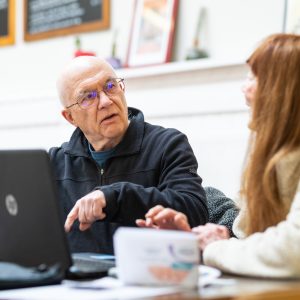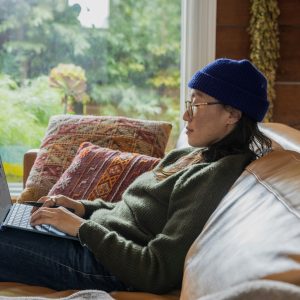When we first met Tristan, life felt overwhelming. Like many unpaid carers, their focus was on supporting someone else, but it was affecting their own wellbeing. Sleep was difficult, and “racing thoughts at night” left them feeling drained.
Years ago, Tristan had used a tablet to relax, but when it broke, they lost a valuable source of comfort. They had a phone, but it wasn’t easy to use. Because of a visual impairment, typing messages was frustrating and reading small text was difficult. This knocked their confidence and meant they often had to make phone calls instead. But phone calls were challenging too — memory and processing difficulties following an operation made conversations stressful, especially when waiting on hold for long periods.
Tristan wanted to try relaxation apps, but they didn’t know how to find or download them. Passwords were another constant barrier, and the flood of notifications and emails left them feeling overwhelmed.
Step-by-Step Support
Through our digital support service for unpaid carers in Leeds, we loaned Tristan a large-screen tablet and met with them for six sessions at a local community centre.
Together, we worked on practical skills including:
- Connecting to Wi-Fi
- Downloading and organising apps
- Using accessibility features like bigger text and colour changes
- Registering for online accounts
- Turning off unnecessary notifications
- Using a password manager safely
We also introduced a stylus, which made the tablet much easier to use than fingers alone. By syncing their phone and tablet, we ensured they could access emails, shopping apps, and texts with greater comfort. Importantly, we focused on learning through practice — building confidence step by step.
A Positive Change
Since the sessions, Tristan feels more in control and more connected. They now use puzzle apps and YouTube videos to relax, shop online with confidence, and even play music for the person they care for, sparking happy memories. They’ve also begun using their phone as a hotspot so they can stay connected wherever they are.
The benefits go beyond technology. Meeting in the community centre gave Tristan the confidence to rejoin an art class they used to love. They’ve even started helping friends and family with their devices — including teaching relatives abroad to use WhatsApp. That led to a joyful video call with family they hadn’t seen in fifty years.
Why It Matters
For unpaid carers like Tristan, digital support isn’t just about learning new skills. It’s about reducing stress, building confidence, and opening doors to connection, relaxation, and joy.

